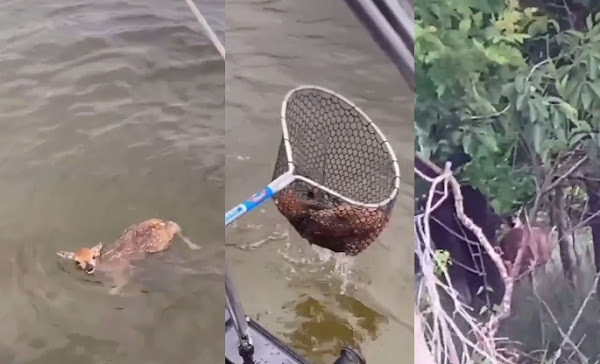These fishermen scooping up a struggling fawn in a fishing net and driving it back to shore to reunite it with its mother.
Fawn, so sweet and pure, are natural wonders of the forest. With their quiet and elusive nature, deer tend to be very protective of their young, but in order to survive, they may have to leave their fawn by themselves for a few hours to go in search of food. Fawn depend on their mothers to grow and thrive in their natural habitats.
Many doe give birth to single fawns, twins or triplets in May or June. A fawn is born weighing in at about five pounds and will boast a beautiful red coat. This shade helps it blend in with its natural habitat -- the forest.
White spots accompany the red coat of fur. The white spots will slowly start to fade away as the fawn reaches five months of age and begins to go through his first "molt," which is when he develops his winter coat.
A doe may leave her fawns under a brush or other protective cover up until around three weeks of age. Until two weeks of age, it is necessary for Mama Deer to stimulate her babies to assist them in eliminating.
Fawn may nurse from their mothers for as long as six months, but sometimes they can be weened as young as eight weeks if their rumen, which is part of their digestive tract, is able to function on its own.
The fawns are able to walk within hours after being born, and run within a few days. But they are programmed to lie still rather than run for about three weeks. By the time they are about two weeks old, they can outrun most predators. Fawns spend the majority of their time in hiding for the first month of their life. At about six weeks, the fawn begins to tag along with its mother everywhere she goes.
A new born fawn weighs around as much as a new born baby- between 4 to 8 pounds. It is often compared to the size of a large house cat with really, really long legs! Fawns are really cute with their spindly legs, polka dots and tiny twitching tails. The mother deer or doe may nurse her fawn three to four times a day. Deer milk is very rich. Once the fawn is old enough, it eats the same food as its mother…
VIDEO
Fawn, so sweet and pure, are natural wonders of the forest. With their quiet and elusive nature, deer tend to be very protective of their young, but in order to survive, they may have to leave their fawn by themselves for a few hours to go in search of food. Fawn depend on their mothers to grow and thrive in their natural habitats.
Many doe give birth to single fawns, twins or triplets in May or June. A fawn is born weighing in at about five pounds and will boast a beautiful red coat. This shade helps it blend in with its natural habitat -- the forest.
White spots accompany the red coat of fur. The white spots will slowly start to fade away as the fawn reaches five months of age and begins to go through his first "molt," which is when he develops his winter coat.
A doe may leave her fawns under a brush or other protective cover up until around three weeks of age. Until two weeks of age, it is necessary for Mama Deer to stimulate her babies to assist them in eliminating.
Fawn may nurse from their mothers for as long as six months, but sometimes they can be weened as young as eight weeks if their rumen, which is part of their digestive tract, is able to function on its own.
The fawns are able to walk within hours after being born, and run within a few days. But they are programmed to lie still rather than run for about three weeks. By the time they are about two weeks old, they can outrun most predators. Fawns spend the majority of their time in hiding for the first month of their life. At about six weeks, the fawn begins to tag along with its mother everywhere she goes.
A new born fawn weighs around as much as a new born baby- between 4 to 8 pounds. It is often compared to the size of a large house cat with really, really long legs! Fawns are really cute with their spindly legs, polka dots and tiny twitching tails. The mother deer or doe may nurse her fawn three to four times a day. Deer milk is very rich. Once the fawn is old enough, it eats the same food as its mother…
VIDEO



Responses to "Fishermen save drowning fawn, reunite with crying mama"